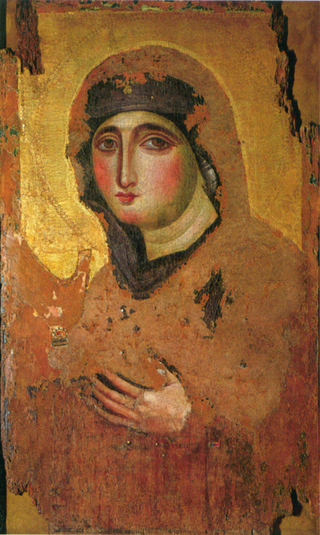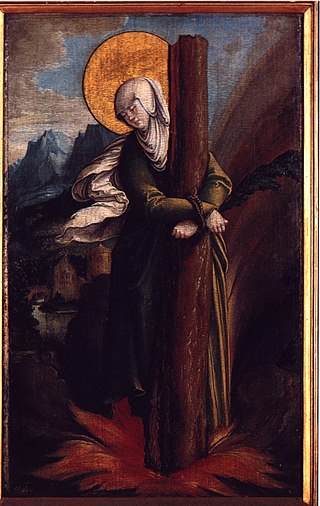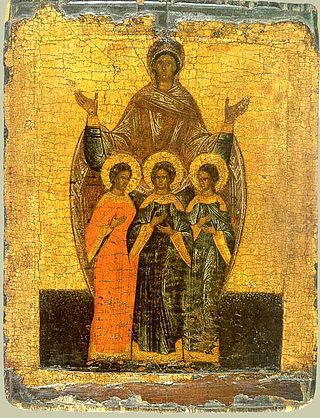Related Research Articles
Olga was a regent of Kievan Rus' for her son Sviatoslav from 945 until 960. Following her baptism, Olga took the name Elenа. She is known for her subjugation of the Drevlians, a tribe that had killed her husband Igor. Even though it was her grandson Vladimir who adopted Christianity and made it the state religion, she was the first ruler to be baptized. Olga is venerated as a saint in the Eastern Orthodox Church with the epithet "Equal to the Apostles". Her feast day is 11 July.

Mary was a first-century Judean woman of Nazareth, the wife of Joseph and the mother of Jesus. She is a central figure of Christianity, venerated under various titles such as virgin or queen, many of them mentioned in the Litany of Loreto. The Eastern and Oriental Orthodox, Church of the East, Catholic, Anglican, and Lutheran churches believe that Mary, as mother of Jesus, is the Mother of God. Other Protestant views on Mary vary, with some holding her to have considerably lesser status.

Flavia Julia Helena, also known as Helena of Constantinople and Saint Helena, was an Augusta of the Roman Empire and mother of Emperor Constantine the Great. She was born in the lower classes traditionally in the Greek city of Drepanon, Bithynia, in Asia Minor, which was renamed Helenopolis in her honor, though several locations have been proposed for her birthplace and origin.

Saint Afra was martyred during the Diocletian persecution. Along with Saint Ulrich, she is a patron saint of Augsburg. Her feast day is August 7. Afra was dedicated to the service of the goddess Venus by her mother, Hilaria. Through his teachings, Bishop Narcissus converted Afra and her family to Christianity. When it was learned that Afra was a Christian, she was brought before Diocletian and ordered to sacrifice to the pagan gods. She refused and was condemned to death by fire.

The Dormition of the Mother of God is a Great Feast of the Eastern Orthodox, Oriental Orthodox, and Eastern Catholic Churches. It celebrates the "falling asleep" (death) of Mary the Theotokos, and her being taken up into heaven. It is celebrated on 15 August as the Feast of the Dormition of the Mother of God. The Armenian Apostolic Church celebrates the Dormition not on a fixed date, but on the Sunday nearest 15 August. In Western Churches the corresponding feast is known as the Assumption of Mary, with the exception of the Scottish Episcopal Church, which has traditionally celebrated the Falling Asleep of the Blessed Virgin Mary on 15 August.

Monica was an early North African Christian saint and the mother of Augustine of Hippo. She is remembered and honored in the Catholic and Orthodox Churches, albeit on different feast days, for her outstanding Christian virtues, particularly the suffering caused by her husband's adultery, and her prayerful life dedicated to the reformation of her son, who wrote extensively of her pious acts and life with her in his Confessions. Popular Christian legends recall Monica weeping every night for her son Augustine.

Saints Faith, Hope and Charity, are a group of Christian martyred saints, venerated together with their mother, Sophia ("Wisdom").

Saint Hermenegild or Ermengild, was the son of king Liuvigild of the Visigothic Kingdom in the Iberian Peninsula and southern France. He fell out with his father in 579, then revolted the following year. During his rebellion, he converted from Arianism to Catholicism. Hermenegild was defeated in 584 and exiled. His death was later celebrated as a martyrdom due to the influence of Pope Gregory I's Dialogues, in which he portrayed Hermenegild as a "Catholic martyr rebelling against the tyranny of an Arian father."
Saint NinoEqual to the Apostles and the Enlightener of Georgia was a woman who preached Christianity in the territory of Caucasian Iberia, of what is now part of Georgia. It resulted in the Christianization of the royal house of Iberia, with the consequent Christianization of Iberia.

Saint Anastasia is a Christian saint and martyr who died at Sirmium in the Roman province of Pannonia Secunda. In the Eastern Orthodox Church, she is venerated as St. Anastasia the Pharmakolytria, i.e. "Deliverer from Potions". This epithet is also translated as "One who Cures (Wounds)" in Lampe's A Patristic Greek Lexicon.
Pomponia Graecina was a noble Roman woman of the 1st century who was related to the Julio-Claudian dynasty. She was the wife of Aulus Plautius, the general who led the Roman conquest of Britain in 43 AD, and was renowned as one of the few people who dared to publicly mourn the death of a kinswoman killed by the Imperial family. It has been speculated that she was an early Christian. She is identified by some as Lucina or Lucy, a saint honoured by the Roman Catholic Church.

Menas of Egypt, a martyr and wonder-worker, is one of the most well-known Coptic saints in the East and the West, due to the many miracles that are attributed to his intercession and prayers. Menas was a Coptic soldier in the Roman army martyred because he refused to recant his Christian faith. The common date of his commemoration is November 11, which occurs 13 days later on the Julian calendar.
Saint Kyriaki, also known as Saint Kyriaki the Great Martyr, is a Christian saint, who was martyred under the emperor Diocletian.

Felicitas of Rome, also anglicized as Felicity, is a saint numbered among the Christian martyrs. Apart from her name, the only thing known for certain about this martyr is that she was buried in the Cemetery of Maximus, on the Via Salaria on a 23 November. However, a legend presents her as the mother of the seven martyrs whose feast is celebrated on 10 July. The Eastern Orthodox Church celebrates their martyrdom on 25 January.

Metrophanes, Chi Sung or Mitrophan was the first Chinese Eastern Orthodox priest to be martyred. He was killed with his family members and church followers in 1900 during the Boxer Rebellion. He is the best known of some 222 Holy Chinese Martyrs glorified in August 2000 by the Eastern Orthodox Church. Metrophanes was stabbed in the chest by a crowd of rebels. Also considered martyrs are his wife Tatiana, whose Chinese name was Li, his sons, 23-year-old Isaiah and eight-year-old John, and Isaiah's nineteen-year-old fiancee Maria, who were all killed with him.

The title Virgin is an honorific bestowed on female saints and blesseds in some Christian traditions, including the Eastern Orthodox Church and the Catholic Church.

Christina, born Yazdoi, was a Sasanian Persian noblewoman and Christian venerated after her death as a virgin martyr.

The woman with seven sons was a Jewish martyr described in 2 Maccabees 7 and other sources, who had seven sons that were arrested by Antiochus IV Epiphanes, who forced them to prove their respect to him by consuming pork. When they refused, he tortured and killed the sons one by one in front of the unflinching and stout-hearted mother.

August 26 - Eastern Orthodox liturgical calendar - August 28
References
- ↑ "St. Euthalia of Syria". Self-Ruled Antiochian Orthodox Christian Archdiocese of North America. Retrieved 2009-02-17.
- 1 2 3 Dunbar, Agnes (1904). A Dictionary of Saintly Women. London: George Bell & Sons. p. 300.
- "The Martyr Euthalia". sojourner7's blog. Bakersfield.com.